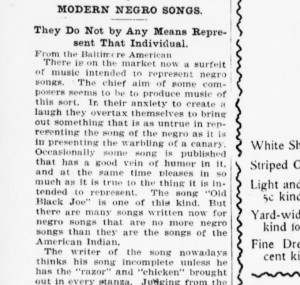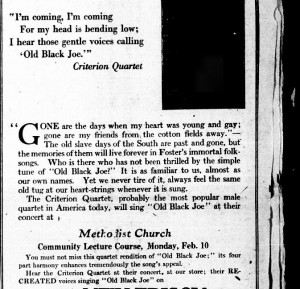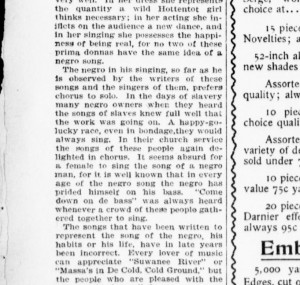According to the music review in The Scranton tribune, 1899, with the growing of market of black slave songs and spiritual songs, some composers (non-black) started to produce these kinds of black music. However, the critique pointed out that many of these “new productions” were obvious “fake”, by failing to use “correct” words for pop black culture. Among these new productions, the song “Old Black Joe” was one of the few successful examples that true to African American’s life.
“Old Black Joe” is a song composed by by Stephen Forster (1826–1864) and it was published by Firth, Pond & Co. of New York in 1860. Foster wrote it as a synthesis of his ideals for stage and parlour ballads. The lyrics for the song was from first person recount, describing sadness of losing friends “in the cotton fields”, without any use of Black slangs or tones. The oldest version of notated music of “Old Black Joe” that held in Library of Congress showed a solo male voice line (marked as Joe) with chorus of SATB. Audiences can hear “call and response” in the music in a specific Jubilee Singer’s performing style.
Recording: http://www.loc.gov/item/jukebox.1814/#rights-and-access
However, the “real negro music”, described by the writer of Modern Negro Songs, should be in chorus setting rather than solo and should be sung by men rather than women. As the writer said, “It seems absurd for a female to sing the song of a Negro man, for it is well known that in every age of the Negro song the Negro has prided himself on his bass.” However, evidence from members of The Jubilee Singers and recordings of early work songs can prove he wrong.
Women sang a work Song:
Bibliography:
Evening times-Republican. (Marshalltown, Iowa), 08 Feb. 1919. Chronicling America: Historic American Newspapers. Lib. of Congress. <http://chroniclingamerica.loc.gov/lccn/sn85049554/1919-02-08/ed-1/seq-8/>
The Scranton tribune. (Scranton, Pa.), 16 Jan. 1899. Chronicling America: Historic American Newspapers. Lib. of Congress. <http://chroniclingamerica.loc.gov/lccn/sn84026355/1899-01-16/ed-1/seq-5/>
. “Foster, Stephen C..” Grove Music Online. Oxford Music Online. Oxford University Press. Web. 24 Feb. 2015.<http://www.oxfordmusiconline.com/subscriber/article/grove/music/10040>.




S, you do a nice job of pointing out the laughable contradictions in the Scranton reviewer’s writing. Looking for newly composed music that successfully represents black traditions, he allows Stephen Foster’s “Old Black Joe,” which in reality has nothing to do with spirituals or any other black song. And your other reviewer is seriously misinformed about what black music is “supposed” to sound like – proof that the commercial music market influenced perceptions far more than actual practices at the time.
A few things to watch out for in future posts:
1) If you mention sheet music, you should try to show it to us through a screen shot or at least a link. I would be surprised if it were originally composed for chorus rather than solo voice, given that it was meant to be a parlor song.
2) Since you’re trying to show that it’s silly for “Old Black Joe” to be considered anything like “authentic” black music, you should describe its melody a bit. What scale does it use? What form does it use? Are either of these related in any way to the music it’s trying to represent?
3) Finally, remember that it’s not enough to embed a screen shot of an archival article in your post; you need to discuss what the writer says, emphasizing certain phrases or sentences and *interpreting* their viewpoint for your reader. Not all readers will understand the significance of each source you reproduce or quote; it’s up to you to explain why you picked that source and what it teaches us.
This is a great first post – I’m looking forward to the next one!